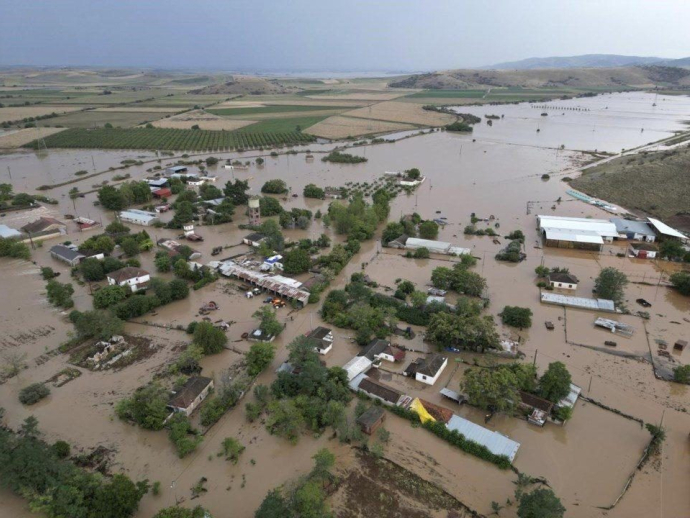Greece broke new records for penetration of renewables and lower consumption in 2023
In a statement to the ANA, the president and CEO of Independent Power Transmission Operator (IPTO) Manos Manousakis said that 'green' power production combined with large hydropower rose to 57% of total power production in 2023 (of which 47.9% were RES and 9.09% hydropower), breaking the previous record of 2022.
This was the result of investments in new RES units and the development of new networks needed to trasmit 'green' energy.
According to data processed by Green Tank, presented by the ANA, the energy market passed 16 milestones in 2023 that - barring lower consumption - were chiefly related to the higher participation of RES and reduced participation of fossil fuels in the energy balance, an equivalent increase in RES and a shift by consumers to producing their own energy. Domestic natural gas consumption fell 10.1 pct in 2023, demand for electricity over the 11-month period was down 2.9 pct - falling below the level of 2020 when lockdowns were in place - while consumption of petrol and diesel fuels was reduced by 7 pct.
Green Tank energy policy analyst Nikos Mantzaris, in a statement to the ANA, said: "In spite of a decline in energy prices in 2023, Greece continued to reduce both consumption of electricity and that of gas. This trend, combined with the continued development of RES, especially by the citizens through self-consumer systems, is cementing changes in energy behaviour that began during the crisis and gives hope for a more decisive shift of the country's energy model toward sustainability."
Green Tank's analysis of the energy market per sector showed the following:
Power production
Up until December 2023:
1) For 672 hours (or 28 days or 7.67% of the year) Greece functioned without any lignite coal.
2) Coal production in 2023 was the lowest since the 1970s, 15% less than the previous low.
3) Use of natural gas for power production plunged to 14.7 TWh, close to that of 2018.
4) Lignite and natural gas provided 4.3 fewer TWh of electricity than in 2022 for a record combined low of 19.2 TWh.
Up until November 2023:
5) The shares of lignite in power generation (9.9%) and demand coverage (8.9%) fell below the 10% "barrier" for the first time.
6) Clean energy (RES and large hydro), with 23.2 TWh, for the first time covered more than half of demand (51.2%) and 57% of electricity generation.
7) The contribution of RES alone (19.6 TWh) exceeded that of natural gas and lignite together (17.5 TWh) for the first time.
8) The demand for electricity (45.3 TWh) was the lowest of the decade, even lower than that of the first year of the pandemic in 2020.
Emissions
Up until November 2023:
9) Emissions of the entire Greek power sector, including oil plants on the non-interconnected islands, hit a record low of 13.35 million tons of CO2, 23% less than the previous low of 17.3 million tons in 2022.
10) PPC thermal units in particular reduced their carbon footprint to 10.2 million tons of CO2, a performance 25% lower than the 13.6 million tons in the same period of 2022.
Natural Gas
Up until December 2023:
11) Total natural gas consumption was 50.9 TWh, the second lowest in six years (50.4 TWh in 2018). It decreased by 10.1% compared to 2022 and by 27.2% compared to 2021, the year the energy crisis began.
12) In electricity (34.54 TWh) and distribution networks (11.19 TWh) the use of gas decreased in 2023 compared to 2022 (-17.1% and -8.1% respectively). In contrast, the use in industry (5.18 TWh) increased significantly (+84.7%) compared to 2022, but remained 27.8% lower than the five-year average.
13) The top natural gas source was LNG from Revythoussa with 29.49 TWh (54.7%), and second was Russian gas from Sidirokastro with 14.71 TWh (27.3%).
14) Large increases in Russian gas imports in 2023. Russian gas was responsible for 42.8% of the country's total imports, which entered the country not only from the Turkstream pipeline (14.71 TWh) but also in the form of LNG from Agia Triada (8.38 TWh).
Self-consumers and Energy Communities
Up until December 2023:
15) Doubling of electrified power from self-consumers (by citizens, municipalities, farmers, energy communities and other agencies) within one year. In 2023 the electrified power of self-consumer projects reached 421.3 MW (up from 216.9 MW in 2022, 100.2 MW in 2021, 53.2 MW in 2020, 33.8 MW in 2019).
16) Electrified power of self-consumer projects in energy communities tripled from 4.2 MW at the end of 2022 to 14 MW in 2023 (1.2 MW in 2021, 0.03 MW in 2020).
Finally, in the petroleum market, a decrease in consumption by 7% was recorded, which was due to a reduction in the demand for heating oil by 32%. Conversely, according to data from the petroleum trading companies association (SEEPE), the demand for petrol (which is also due to the increase in tourist traffic) rose by 4% and that for diesel by 3%.




























































































































































































































































































































































































































































































































































































































































































































































































































































































































































































































































































































































































































































































